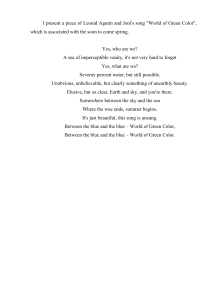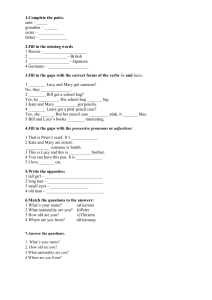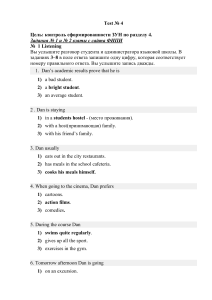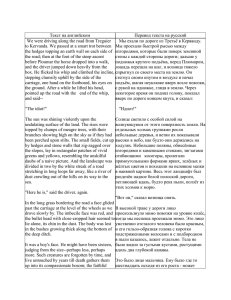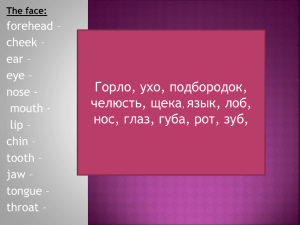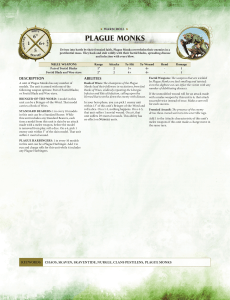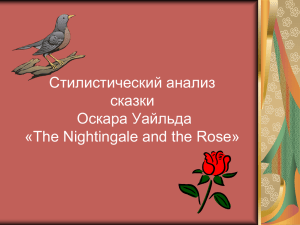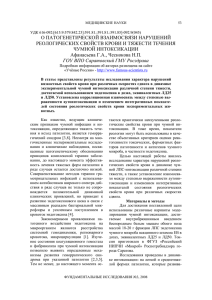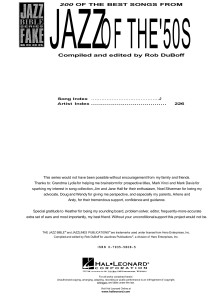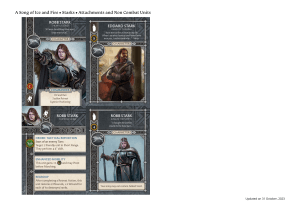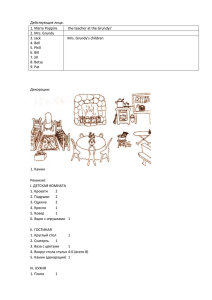А.С. ПУШКИН ПИР ВО ВРЕМЯ ЧУМЫ Из Вильсоновой трагедии
реклама
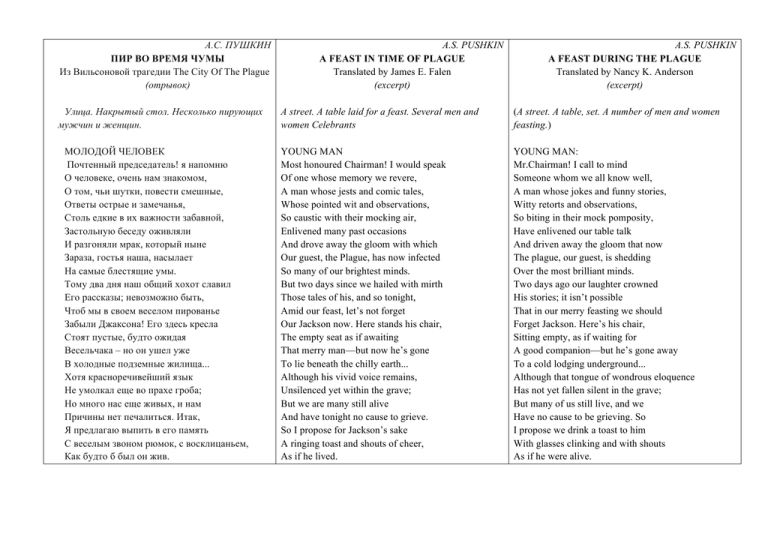
А.С. ПУШКИН ПИР ВО ВРЕМЯ ЧУМЫ Из Вильсоновой трагедии The City Of The Plague (отрывок) Улица. Накрытый стол. Несколько пирующих мужчин и женщин. МОЛОДОЙ ЧЕЛОВЕК Почтенный председатель! я напомню О человеке, очень нам знакомом, О том, чьи шутки, повести смешные, Ответы острые и замечанья, Столь едкие в их важности забавной, Застольную беседу оживляли И разгоняли мрак, который ныне Зараза, гостья наша, насылает На самые блестящие умы. Тому два дня наш общий хохот славил Его рассказы; невозможно быть, Чтоб мы в своем веселом пированье Забыли Джаксона! Его здесь кресла Стоят пустые, будто ожидая Весельчака – но он ушел уже В холодные подземные жилища... Хотя красноречивейший язык Не умолкал еще во прахе гроба; Но много нас еще живых, и нам Причины нет печалиться. Итак, Я предлагаю выпить в его память С веселым звоном рюмок, с восклицаньем, Как будто б был он жив. A.S. PUSHKIN A FEAST IN TIME OF PLAGUE Translated by James E. Falen (excerpt) A.S. PUSHKIN A FEAST DURING THE PLAGUE Translated by Nancy K. Anderson (excerpt) A street. A table laid for a feast. Several men and women Celebrants (A street. A table, set. A number of men and women feasting.) YOUNG MAN Most honoured Chairman! I would speak Of one whose memory we revere, A man whose jests and comic tales, Whose pointed wit and observations, So caustic with their mocking air, Enlivened many past occasions And drove away the gloom with which Our guest, the Plague, has now infected So many of our brightest minds. But two days since we hailed with mirth Those tales of his, and so tonight, Amid our feast, let’s not forget Our Jackson now. Here stands his chair, The empty seat as if awaiting That merry man—but now he’s gone To lie beneath the chilly earth... Although his vivid voice remains, Unsilenced yet within the grave; But we are many still alive And have tonight no cause to grieve. So I propose for Jackson’s sake A ringing toast and shouts of cheer, As if he lived. YOUNG MAN: Mr.Chairman! I call to mind Someone whom we all know well, A man whose jokes and funny stories, Witty retorts and observations, So biting in their mock pomposity, Have enlivened our table talk And driven away the gloom that now The plague, our guest, is shedding Over the most brilliant minds. Two days ago our laughter crowned His stories; it isn’t possible That in our merry feasting we should Forget Jackson. Here’s his chair, Sitting empty, as if waiting for A good companion—but he’s gone away To a cold lodging underground... Although that tongue of wondrous eloquence Has not yet fallen silent in the grave; But many of us still live, and we Have no cause to be grieving. So I propose we drink a toast to him With glasses clinking and with shouts As if he were alive. ПРЕДСЕДАТЕЛЬ Он выбыл первый Из круга нашего. Пускай в молчаньe Мы выпьем в честь его. МОЛОДОЙ ЧЕЛОВЕК Да будет так! CHAIRMAN: MASTER OF REVELS He was the first To leave our band. And so let’s drink A silent toast. YOUNG MAN So be it then. Все пьют молча. He was the first Of our group to go. In silence We’ll drink to honor him. YOUNG MAN: So be it! (All drink silently.) (All drink in silence.) ПРЕДСЕДАТЕЛЬ Твой голос, милая, выводит звуки Родимых песен с диким совершенством; Спой, Мери, нам уныло и протяжно, Чтоб мы потом к веселью обратились Безумнее, как тот, кто от земли Был отлучен каким-нибудь виденьем. Your voice, dear Mary, can evoke The dark rich sounds of native song; So sing us, Mary, something sad, That we may then more madly still To mirth return, like one who wakes From some dark dream to earth again. CHAIRMAN: Your voice, my dear, brings forth the songs Of your native land with rude perfection; Sing, Mary, something sad and haunting, To make us turn again to our merrymaking With a wilder spirit, like one who is seized And carried away by some unearthly vision. МЕРИ (поет) <…> MARY (sings) <…> MARY: (Sings.) <…> ПРЕДСЕДАТЕЛЬ Благодарим, задумчивая Мери, Благодарим за жалобную песню! В дни прежние чума такая ж, видно, Холмы и долы ваши посетила, И раздавались жалкие стенанья По берегам потоков и ручьев, Бегущих ныне весело и мирно Сквозь дикий рай твоей земли родной; И мрачный год, в который пало столько MASTER OF REVELS We thank you, Mary, pensive lass, We thank you for your mournful air. In former days some plague like ours Attacked your lovely hills and vales, And woeful moans back then arose Above your streams and purling brooks, Which now once more in joy and peace Meander through your native realm; CHAIRMAN: Thank you, melancholy Mary, Thank you for that plaintive song! In earlier days the plague, it’s clear, Visited your native hills and dales And moans of sorrow then were heard Along those brooks and streams which now Flow so peaceful and so merry Through your land’s rude paradise. That gloomy year, in which there fell so many Отважных, добрых и прекрасных жертв, Едва оставил память о себе В какой-нибудь простой пастушьей песне, Унылой и приятной... Hет, ничто Так не печалит нас среди веселий, Как томный, сердцем повторенный звук! МЕРИ О, если б никогда я не певала Вне хижины родителей моих! Они свою любили слушать Мери; Самой себе я, кажется, внимаю, Поющей у родимого порога. Мой голос слаще был в то время: он Был голосом невинности... And now that dreadful year that took So many brave and noble souls Has only left the barest trace In this your simple, rustic song, So touching and so sad... There’s nought Could move us more at this our feast Than sounds remembered by the heart. MARY If only I had never learned To sing such songs so far from home! My parents loved their Mary’s voice, And even now I seem to hear Myself in song outside our door. My voice was sweeter then and sang In tones more pure and true. ЛУИЗА Не в моде Теперь такие песни! Но все ж есть Еще простые души: рады таять От женских слез и слепо верят им. Она уверена, что взор слезливый Ее неотразим – а если б то же О смехе думала своем, то, верно, Все б улыбалась. Вальсингам хвалил Крикливых северных красавиц: вот Она и расстоналась. Ненавижу Волос шотландских этих желтизну. ПРЕДСЕДАТЕЛЬ Послушайте: я слышу стук колес! LOUISA Such songs Are out of fashion now. And yet, There still are simple souls who pine At women’s tears... and deem them real. Our Mary thinks a tearful eye Invincible,—but if she thought Her laughter so, then be assured, She’d laugh and laugh. But Walsingham Has praised these shrieking northern belles, And so she moans. Oh how I loathe These Scottish heads of flaxen hair! MASTER OF REVELS Be still. I hear the wagon wheels. Among the brave, the beautiful and good, Has hardly left a trace, except the memory Of simple shepherds, singing an old song, A sad and sweet one....Nothing else Can move us so amid our merrymaking As such a lingering, heart-repeated sound! MARY: Oh, if only I had never sung To anyone outside my parents’ croft! How they loved to listen to their Mary; It seems to me that I can hear myself Singing in the house where I was born. My voice was sweeter then—it was The voice of innocence... LOUISA: Now those songs Are hopelessly passe. But there are still Some fools who like to melt when women cry, Who’ll swallow it hook, line, and sinker. She’s decided that her tearful look Can’t be resisted—if that’s what she thought About her laugh, no doubt we’d see her Grinning all the time. Walsingham liked The weepy northern beauties—so of course She’s got to moan and groan. I can’t stand The jaundice-yellow hair of these Scotch girls. CHAIRMAN: Listen. I hear the creak of wheels! Едет телега, наполненная мертвыми телами. Негр управляет ею. Ага! Луизе дурно; в ней, я думал, По языку судя, мужское сердце. Но так-то – нежного слабей жестокий, И страх живет в душе, страстьми томимой! Брось, Мери, ей воды в лицо. Ей лучше. МЕРИ Сестра моей печали и позора, Приляг на грудь мою. ЛУИЗА (приходя в чувство) Ужасный демон Приснился мне: весь черный, белоглазый.... Он звал меня в свою тележку. В ней Лежали мертвые – и лепетали Ужасную, неведомую речь.... Скажите мне: во сне ли это было? Проехала ль телега? МОЛОДОЙ ЧЕЛОВЕК Ну, Луиза, Развеселись – хоть улица вся наша Безмолвное убежище от смерти, Приют пиров, ничем невозмутимых, Но знаешь, эта черная телега Имеет право всюду разъезжать. Мы пропускать ее должны! Послушай, Ты, Вальсингам: для пресеченья споров (A cart goes by, laden with corpses and driven by a black man.) MASTER OF REVELS Louisa swoons! To hear her talk, You’d think her heart was like a man’s. The cruel prove weaker than the soft, And dread can strike the fiercest soul. Some water, Mary... she’ll come round. MARY Come, sister of my shame and woe, Lean back on me. LOUISA (regaining consciousness) I thought I saw Some dreadful thing—all black... white-eyed. That called me to its cart... and there The dead lay deep... and babbled words... Some strange and unfamiliar tongue... But tell me, did I only dream? Or did that cart go by? YOUNG MAN Louisa! Lift up your heart. Although our street Is refuge safe enough from death, A place for feasts, where grief is banned, That sombre cart, as you well know, Has right to travel where it will, And let it pass we must. But now, (A wagon filled with bodies passes. A black man is driving.) Ah! Louisa’s fainted; judging from her words, I’d thought she had a mannish heart. But so it is: the cruel are weaker than the tender, And fear still lives in souls worn out by passions. Mary, dash water in her face. She’s coming to. MARY: Sister of my shame and sorrow, Lean upon my breast. LOUISA: (Reviving) I dreamed I saw A hideous demon, black all over, with white eyes... He called me to his wagon. Lying in it Were the dead—and they were muttering In some hideous, unknown language. Tell me: was it after all a dream? Did the wagon pass? YOUNG MAN: Well, Louisa, Cheer up—although the street’s all ours, An untrafficked hiding-place from death Where our revels are disturbed by no one, Still, you must know: that black wagon Has the right to go to any place. We have to let it through! But listen: Walsingham, to cut off all these quarrels And clear away these female fainting fits, И следствий женских обмороков спой Нам песню, вольную, живую песню, Не грустию шотландской вдохновенну, А буйную, вакхическую песнь, Рожденную за чашею кипящей. ПРЕДСЕДАТЕЛЬ Такой не знаю, но спою вам гимн Я в честь чумы, – я написал его Прошедшей ночью, как расстались мы. Мне странная нашла охота к рифмам Впервые в жизни! Слушайте ж меня: Охриплый голос мой приличен песне. МНОГИЕ Гимн в честь чумы! послушаем его! Гимн в честь чумы! прекрасно! bravo! bravo! Good Walsingham, let’s cancel strife And all these women’s fainting spells. Come, sing a rash and lively song, No tune composed of Scottish grief— But reckless, bacchanalian song, One fit for friends and flaming cups! MASTER OF REVELS I know no songs like this. I’ll sing A hymn to plagues. I wrote the thing Last night when we had quit the feast. A strange, compulsive need for rhyme, Quite new to me, then gripped my soul. My throaty voice well suits the song... VOICES FROM THE CROWD A hymn to plagues! Let’s hear it then! A hymn to plagues! Bravo! Well done! Sing us a song—a bold and lively song, No lamentation of the Scottish Muse— A rowdy song, a song in Bacchus’s mode, One inspired by foaming goblet. CHAIRMAN: I don’t know one like that—here’s what I’ll sing: A hymn in honor of the Plague. I wrote it Late last night, after we had parted. I found I had a strange poetic impulse For the first time in my life! So listen: My harsh voice will befit the song. MANY VOICES: A hymn in honor of the Plague! Let’s hear it! A hymn in honor of the Plague! Splendid! Bravo!
